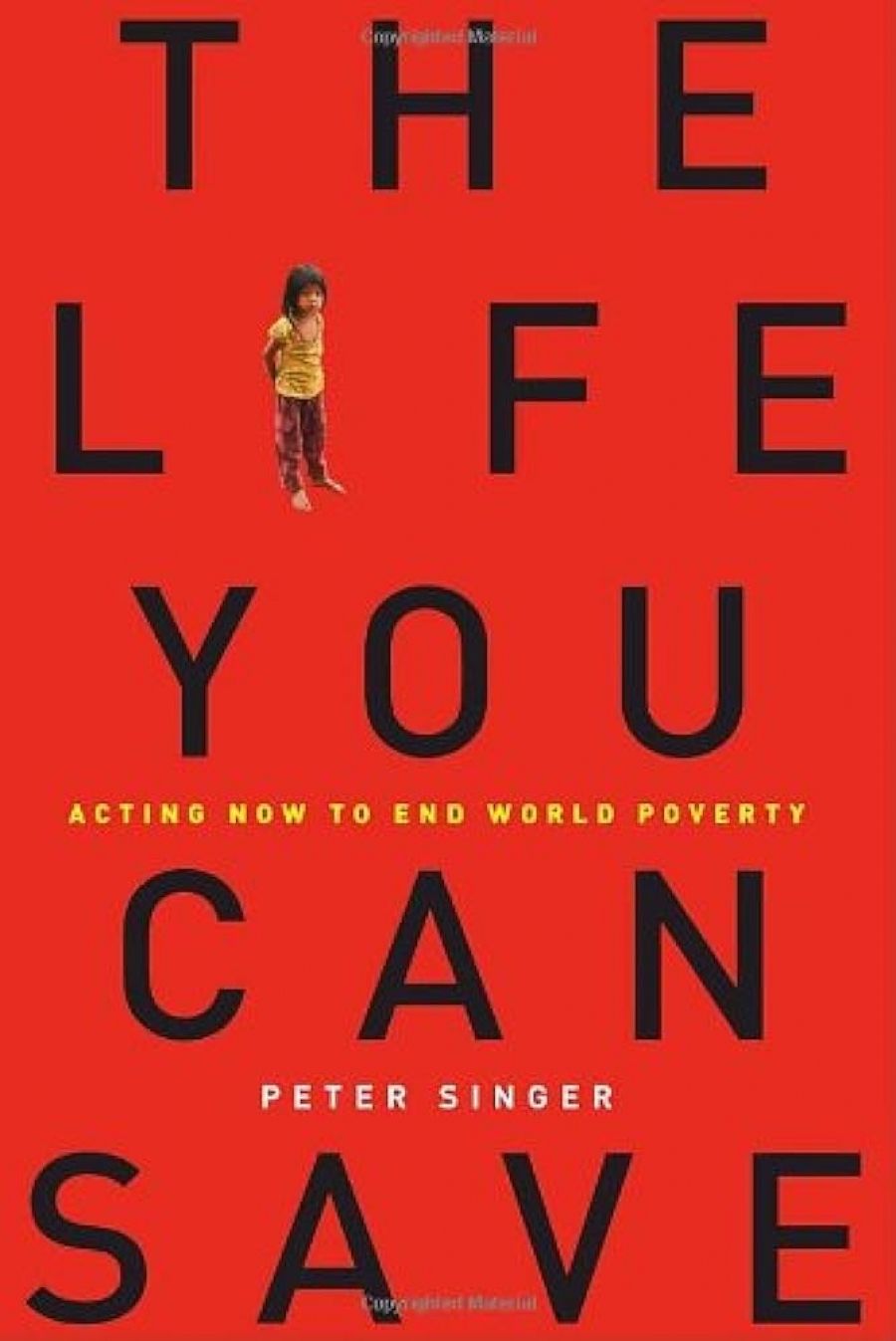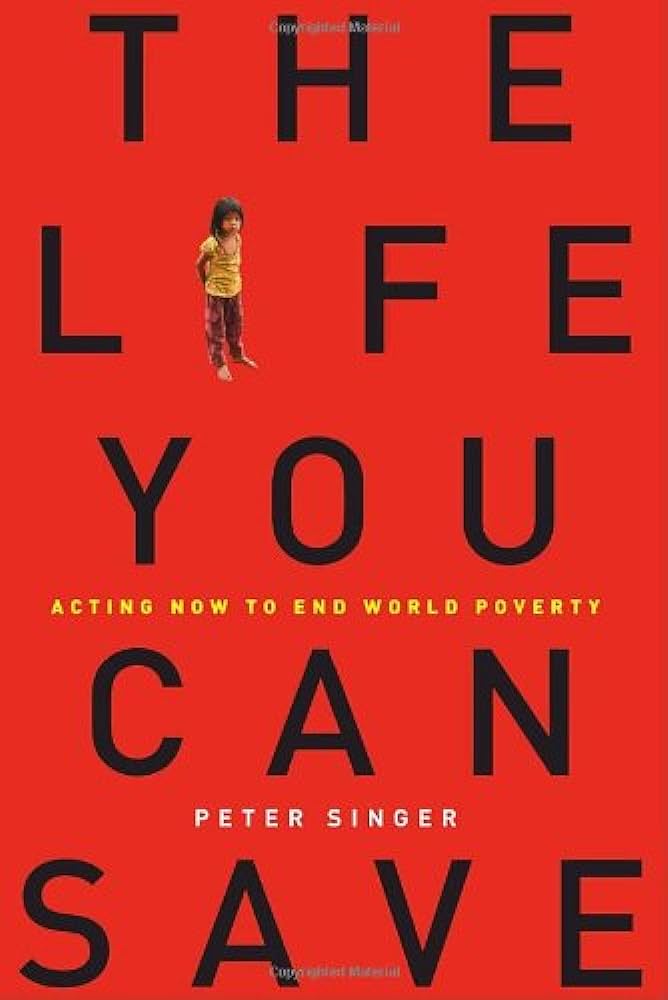
- Free Article: No
- Contents Category: Philosophy
- Review Article: Yes
- Article Title: Moral kicks beside the pond
- Online Only: No
- Custom Highlight Text:
On your way to work, you pass a small pond. On hot days, children sometimes play in the pond, which is only about knee deep. The weather’s cool today, though, and it’s early in the morning, so you are surprised to see a child splashing about in the pond. As you get closer you see that it is a very young child, just a toddler, who is flailing about, unable to stay upright or walk out of the pond ... If you don’t wade in and pull him out, he seems likely to drown. Wading in is easy and safe, but you will ruin the new shoes you bought only a few days ago, and get your suit wet and muddy ... What should you do?
- Book 1 Title: The Life You Can Save
- Book 1 Subtitle: Acting now to end world poverty
- Book 1 Biblio: Text, $34.95 pb, 221 pp
- Book 1 Cover Small (400 x 600):

- Book 1 Cover (800 x 1200):

Singer’s suggestion to his readers, however, is that most of us, most of the time, do in fact behave in ways which imply that our moral priorities require severe censure. Singer reminds us that every day children die from poverty-related causes. He tells us that as individuals we are in a powerful position to do something about these deaths. Like the bystander in the story, by sacrificing no more than our shoes and possibly our suit we can save the lives of small children the world over who are dying of poverty. Twenty-seven thousand children each day die of poverty-related causes. Our relationship to those children, Singer argues, is the same in all relevant respects as our relationship to the child in the pond.
The child, of course, is not in the pond on my way to work, but is in a poor country in another region of the world. By giving a small proportion of my income, however, I can save the child’s life. Singer asks us to assess our moral priorities. Most people reading this review, for example, can drink their recommended eight glasses of water a day out of a tap for something like one cent, and yet many of us insist on buying bottled water at, say, two dollars. Or we feel the need to renew our wardrobe each season, when our existing clothes show no signs of wear and tear. The cost of this new shirt or that designer underwear may be sufficient to purchase the supplies used by organisations such as UNICEF or Oxfam to save the life of a child.
Singer reinforces his case by moving beyond our intuitive response to the pond story, and outlining the logical shape of his argument. A first premise is that the suffering and death which arise from the absence of food, shelter, and health care are bad. A second premise is that, when in the position to stop something bad from happening without having to give up something of similar importance, it is wrong not to act. A third: that we can prevent the suffering and death by donating to aid agencies without having to give up anything of great importance. Thus, ‘if you do not donate to aid agencies, you are doing something wrong’.
Singer knows this is a strong statement, and much of the book is taken up with engaging various objections or evasions. One chapter expressly addresses itself to common objections, the counter arguments that Singer has received from his audiences over the years. In another chapter, Singer includes a review of recent psychological research into the factors which shape our responses to need – why it might be, for example, that we don’t give, despite seeing and understanding the need; how we are influenced by the behaviour of others; factors such as parochialism, a sense of futility, or beliefs about the diffusion of responsibility.
The Life You Can Save carries the subtitle, ‘Acting now to end world poverty’, and the blurb on the back cover tells us that Singer ‘offers a solution to world poverty’. This is where I take issue with Singer’s enterprise. I don’t think Singer gives us a solution to world poverty. Singer persuasively makes the case for giving; he is entirely correct that there are lives we can save, and that many of them can be saved by curtailing the frivolous uses we have for our income. The pond story is effective as a tool in the discussion of our moral responsibilities. It helps us to see that if we can help others at little cost to ourselves, we should indeed help them.
But as I have argued elsewhere (in the Australian Journal of Political Science, 43:4, 2008), the ‘small pond story’ leads us astray when it is used to elaborate what we should do, what actions we should take, in response to our moral obligations. The actual activity of aiding the poor, of solving world poverty – contrary to the impression Singer’s story gives – is not analogous to that of rescuing one child from one small pond. In the pond story, there is a direct, unmediated, individual relationship between the bystander and the child. There is one pond and one child. There is no sense in which this fable can encompass the many and varied relationships between the haves and the have nots in our global context. Indeed, such a simple picture of what needs to be done is fraught with dangers.
World poverty is caused by many factors; global individual charity alone will not resolve it. Nor is it the single moral response required from all of us. In many parts of the world, the poor remain poor not because of a lack of resources, but because of political decisions and structural inequalities which are perpetuated by global, national, and local institutional arrangements and political interests. One need only think of Zimbabwe to understand the depth of the problem here: a country which was once the breadbasket of Africa is now its worst economic basket case – not for lack of resources, but because of gross injustice, authoritarian rule, corruption, wilful abuse of power, favouritism, racism, negligence, and sheer incompetence. Moreover, giving to save lives in Zimbabwe has at times been impossible, because the aid agencies have been shut out by Mugabe and his henchmen.
In many other places, charitable aid by itself is of limited use. Aid can feed the political economy of war, thus elongating conflicts and possibly doing more harm than good. Lives may be saved, but only for a few days, months, or years, in the absence of the creation by political reform of a more secure and just environment – something which giving by itself cannot do. There could be nothing more cruel than saving a child in order to condemn it to a life of slavery, of warfare fed by an economy of aid, of repeated illness and near death experiences because of a complete absence of broader institutional development and political progress toward justice. The nightmare scenario here is that the affluent of the rich countries get their moral kicks from having a monthly credit card debit to Oxfam, and lapse into political quietism regarding global justice. The global poor are kept alive but with little prospect of a life well-lived.
To avoid such a scenario, the global charity which Singer persuasively argues for must be understood as only one piece in the larger puzzle of the solution to global poverty, one built around global institutional reform.
The road to global institutional reform is long and hard, but not futile. Singer does not gainsay efforts in this direction; what he does say – and he is indisputably right about this – is that such long-term efforts will not help the child who is drowning in the pond today. The burden of his argument is that, in the right hands, our charitable giving can make a significant and sustainable difference to that child and her peers. As we incrementally adopt global institutional reform, the path which promises the surest long-term solution to global poverty, one hopes in the meantime – for the sake of today’s children – that Singer is right.


Comments powered by CComment